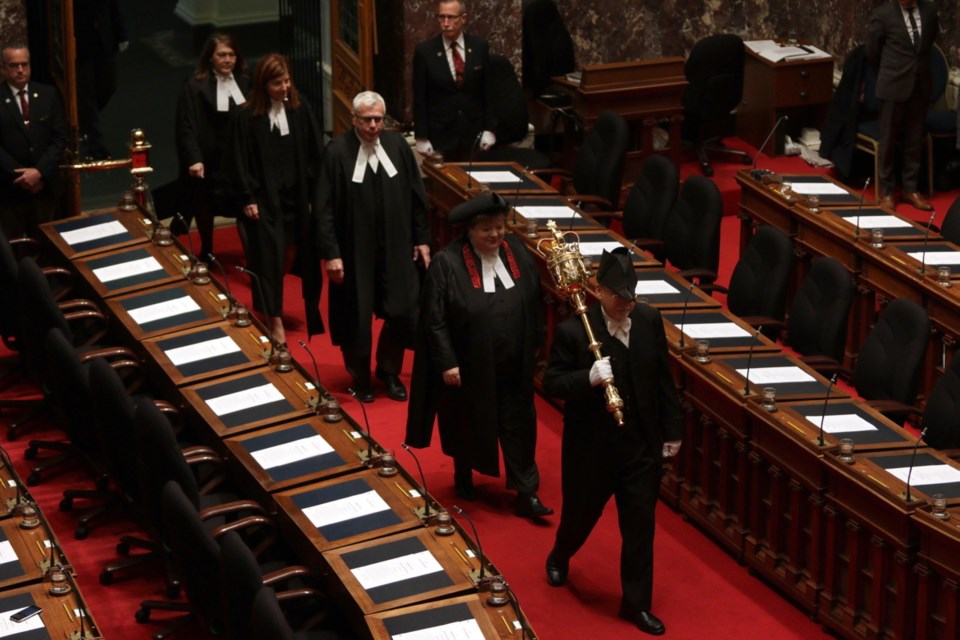Donald Trump has dominated news and social-media chatter since he took office in the U.S., and on Tuesday his shadow managed to darken parts of the provincial budget.
Citing the worrying spectre of a more protectionist regime under Trump, Finance Minister Mike de Jong’s budget included measures to help diversify markets for the province's key exports and improve both the profitability and competitiveness of the business community.
De Jong said B.C. has done more than any other province to establish more markets for its products, noting B.C. now exports just 53.9 per cent of its international goods to the U.S., compared with the more than 86 per cent sent by Alberta and 81 per cent sent by Ontario.
While B.C. has diversified markets by expanding trade with China, Japan and southeast Asia, de Jong warned that the bite of a more protectionist U.S. will still be felt. “Make no mistake, the U.S. remains our largest-single trading partner, and any interruption in that trade will impact us,” de Jong said in his budget speech. “Our successful efforts at diversification won’t completely insulate us from these protectionist tendencies, but they will certainly help.”
To improve diversification, the province has committed $6 million to fund new trade and investment offices in South East Asia.
At home, the budget included initiatives designed to strengthen B.C. business and make it more competitive.
De Jong promised to eliminate over the next two years the provincial sales tax that businesses pay on electricity. The move is expected to save small, medium, large and industrial companies a combined $164 million by 2019-20.
It will be phased in with the rate being cut to 3.5 per cent from seven per cent effective this fall, and fully exempt from PST by April 2019.
It is estimated that large businesses paid $51 million in PST over the last year, while small and medium-sized businesses spent $50 million.
The province also intends to cut the small business corporate tax rate to two per cent from 2.5 per cent effective this April.
The business sector is likely to benefit from the cut in Medical Services Plan premiums, which many large and medium-sized companies pay on behalf of their employees.
On the whole, the business community gave Tuesday’s budget a thumbs-up.
“In macro terms, it is a pretty good budget and it will have an impact on business and consumer confidence,” said Jock Finlayson, executive vice-president of the Business Council of B.C. He noted that when the PST on electricity, tax-rate cut and MSP initiative are combined, it has a solid impact on the bottom line.
“The MSP cut is a benefit to a lot of employers, a lot of large and mid-sized companies pick up that tab for employees. Those employers will see a reduction in payroll taxes, which should be good for jobs and hiring, as well as cash flow.”
Val Litwin, president of the B.C. Chamber of Commerce, said the targeted tax relief puts money back into the pockets of all businesses, which may result in increased hiring and investment in the province.
Of the cut in the small business tax rate, Litwin said they will take it. “It’s never enough, but it’s a terrific start,” he said. “And the PST break on electricity is great because it doesn't just touch large industrial users, but it hits small and medium-sized business — those are big savings.”
Business owner and chairman of the Greater Victoria Chamber of Commerce Al Hasham agreed, noting it’s the kind of break that can stimulate hiring and expansion. “It will have a great impact on small business in both Greater Victoria and the region. I look at it as a small business owner. It’s a great break for me,” he said.
Overall, the Chamber noted the tax burden to the province appears to have been reduced by about $3 billion with this budget.
“This gives consumers and businesses more choice. Choice means freedom to grow, to innovate and to create — for business owners to realize their objectives and dreams,” said Hasham.
Dealing with a more protectionist U.S. on the other hand may be more problematic.
“We are dealing with a moving target,” said Finlayson. “And until we know more about what a renewed NAFTA looks like, and [if] Americans are going to impose a so-called border-adjustment tax at the border, or is there going to be a trade war with China ... you really can't do anything in a budget to anticipate it. It will take another six to 12 months until we know what the future of the Canada-U.S. border [looks like].”
Andrew Wynn-Williams, vice-president of the B.C. division of Canadian Manufacturers and Exporters, suggested B.C.’s companies should be more worried about competition than protectionism.
“Our trade deal with the U.S. is extremely unique. We don’t make stuff for the U.S. and sell it to them, we make stuff with them. We have a lot of cross-border companies,” he said, adding there seems to be little appetite to untangle those deals.
“To us, the concern is competition. [Trump] will reduce taxes, will change regulatory regimes and invest in infrastructure and all that will make U.S. companies more productive and competitive and make it harder for us to compete with the U.S.”
Other budget initiatives aimed at business:
• $87 million for government’s high-tech strategy, details to be released next month
• $40 million in new funding to extend Internet access to rural and remote B.C.
• extending and enhancing tax credits for scientific research and economic development
• the venture capital tax credit will increase to $38.5 million from $35 million



